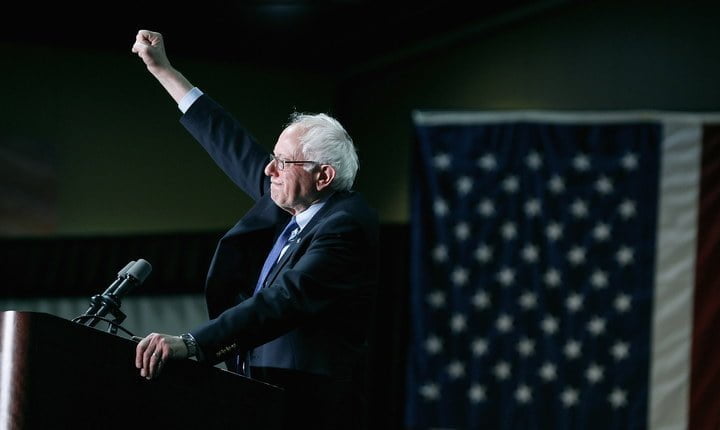Bernie’s Best Week Ever Falls Flat

WASHINGTON — There were few better stretches for Bernie Sanders than the days after his insurgent campaign pulled off an upset win in the Michigan primary.
The primary map shifted to states where Sanders felt confident, he finally found a message that allowed him to seriously compete for the black vote, rival Hillary Clinton stumbled badly several times, and several days were dominated by the battle between Sanders and Donald Trump that Team Bernie always wanted.
But in the end, everything did not come up Bernie.
The Sanders campaign hoardes “momentum” — an intangible possession, unlike delegates — and after Tuesday night, the Sanders campaign is back to insisting they have momentum, as they did in the dire weeks between New Hampshire and Michigan.
Those weeks featured highs and lows for Sanders — but more than anything, they featured Clinton winning big numbers of delegates in southern states, and holding fairly tight in the ones she lost. Then came Michigan, the dream night for Sanders aficionados. All the polls were wrong, all the pundits were wrong, all of the establishment predictions were wrong. Sanders won a narrow victory, but one that was big enough to earn him the momentum.
(Clinton actually won more delegates thanks to her blowout win in Mississippi the same night, but that’s not how momentum works.)
During the week since, Sanders enjoyed multiple days of Clinton apologies after she incorrectly gave the Reagans credit for starting a national conversation about AIDS and drew criticisms for a tone-deaf response to well-publicized violence at Trump rallies.
Sanders, meanwhile, used that same Trump rally violence to launch a well-publicized fight with the Republican frontrunner Sanders aides privately relished and Clinton aides privately dreaded. Trump blamed Sanders for protesters at his rallies, Sanders called Trump a liar, cable news was dominated for days. Trump, said a Bernie aide, gave the Sanders campaign the greatest possible gift: picking a fight.
Meanwhile, Sanders enjoyed a primary battle where he appeared to finally have the upper hand with black voters. Illinois gave him a chance to prove he could compete for black voters. The scale of Sanders’ losses among black voters across the south sent even the most senior members of his campaign reeling, shocked at the scale with which Clinton could rely on voters both candidates had fought for. In Illinois, his campaign ran hard against Chicago mayor Rahm Emanuel, a Clinton ally who’s lost a lot of support with the black community during his time as the city’s leader. The campaign included a TV ad and dozens of mentions of Rahm by Sanders surrogates on the trail.
The Sanders campaign was extremely confident in the message. He contrasted himself much more sharply with Clinton, trying hard to use Michigan, where the candidates held their most contentious televised debate of the cycle, as a model.
Sanders was so confident this approach would work he actually predicted a victory in Ohio despite polls showing him trailing. Polls didn’t matter after Michigan, Sanders insisted. On Tuesday, he lost Ohio and he lost it early in the evening. Clinton, sensing momentum had shifted her way, spoke right away, claiming the night as her own before the final tallies in other states came in.
Sanders didn’t win Illinois either, a huge blow to his campaign. If he did win Missouri, it was extremely close. (Missouri’s results have not yet been decided.) In the end, it was a clean Clinton sweep, or close to one.
Democratic proportional delegate awarding — the delegate math Clinton has relied on in the face of Sanders’ momentum argument — suddenly became very interesting to the Sanders campaign. The campaign was now trying to just do well enough to win delegates everywhere, aides told the Wall Street Journal in an off-message Super Tuesday preview.
There is little doubt that Sanders will go on, however. His team has said over and over they will fight for the last delegate in the last state on the Democratic nomination calendar. As Clinton’s sole opponent, they see little reason to drop out while the money is still pouring in from Sanders’ remarkable grassroots funding base, and they see no point in leaving delegates Clinton hasn’t won to her without a fight.
Sanders was in Arizona Tuesday night, far away from the latest Super Tuesday contest he pushed so hard to win and spent so big to do well in. He didn’t speak directly to the results — offering instead a stump speech in Phoenix that included fewer of the barbs aimed at Clinton from the week previous.
But on Tuesday, Clinton had the momentum, the precious fuel the Sanders campaign needs to survive as viable threat for the Democratic nomination.
Read More..








